Charles Odii, is an entrepreneurship development expert, author and small business advocate. Before his appointment as the Director General (DG), of the Small and Medium Enterprise Development Agency (SMEDAN), Odii worked as the Chief Operating Officer of Red Media Africa and started SME100 Africa in 2014. He also worked as media consultant to the Internal Revenue Board of both Delta and Imo state governments. In this interview with John Osadolor, BusinessDay Managing editor and Favour Okpale, a Correspondent, Odii spoke about the agency’s vision for MSMEs.
SMEDAN seems to have been effective in providing various forms of support for businesses in the country. How do you get the resources for this task?
In one word, I would say collaboration. At SMEDAN, we are very open to collaboration. We engage in collaboration with the private sector, government entities, and international development institutions. And we are doing this because we understand the problems of the MSME ecosystem. At the last count, we know that there are approximately 39 million small businesses, but due to the COVID-19 pandemic, flooding, and other unforeseen circumstances, we lost approximately 2 to 3 million of them. On the 1st of December 2023, Vice President Kashim Shettima constituted the National Council of SMEs. In that council, the Vice President is the chairperson, while the Governors are the chairpersons in their different states. That council does three things. It acts as a one-stop shop for anybody across the states that wants to start and scale up any business enterprise, as well as a feedback mechanism. So if you’ve got a problem in a state, one of the first things that you do is reach out to a business member organisation or the cooperative, and if it cannot be resolved at that level, it goes to the SMEDAN Secretariat. From the SMEDAN Secretariat, it goes to that particular state’s council on SMEs, which the Governor chairs. If, however, it cannot be resolved, it comes to the National Council, and then we try to put a stop to or resolve it. Now, we couldn’t have achieved many of these things if we were not collaborating with state governments.
My predecessor right now happens to be the governor of one of the states and has been very helpful. One of the things we did was to meet him and say to him, Your Excellency, We understand the peculiarities of small businesses in Kastina State; let us try and create a fund for these small businesses in Kastina State. Now, we have funding for three things, such as money for working materials, money to rent or purchase workspaces, and money to boost up your working capital. So, this collaboration has worked very well. Right now, we’re about to collaborate with Nipost. What I’m wearing right now is made with N10,000, which is made in Nigeria. But our small businesses are beginning to complain that the cost of shipping depending on the location can even be more than N10,000. So we’re looking for innovative situations where you can get discounted fees. We understand that these are very, very difficult times for small businesses. So we’re looking out for collaborations with international organisations, the private sector in Nigeria, government institutions, and with our stakeholders in the ecosystem.
Having led the SMEDAN for nine months, what has been your vision to foster the growth of the SMEs?
Our vision basically is, in one word, to continue to grow. G-R-O-W stands for guidance; resources, which can be financial and non-financial; opportunities; and workforce support.
We believe that with the right guidance, the right resources, the right opportunities, and the right workforce support, any nanobusiness can become a microbusiness, the microbusiness can grow into a small one, and the small can grow into a medium, while the medium can become a large entity. In terms of guidance, we’ve set up a one-stop shop where we’re guiding our small businesses. If you want to export, you want to register your business, you want investment, you want standards; through the Standards Organisation of Nigeria (SON), you want to get the National Agency for Food and Drug Administration and Control (NAFDAC) number, we’ve organised and guided our small businesses. This guidance can be accessed virtually or physically from our website. If what you need to do is scale, we can point you in the right direction.
So, we want to be better organised by guiding the ecosystem on knowing who, where, and what to do.
In terms of resources, we understand that finances are very important. We know that capital in Nigeria is very scarce, and it’s also very expensive. I thank His Excellency President Bola Ahmed Tinubu for earmarking as much as 50 billion Naira for the MSME ecosystem, where approximately 1 million nano businesses will get an injection of 50,000 Naira in terms of non-repayable grants into their businesses and enterprises. What this has done is to help our small businesses, especially because we just conducted a report with MoneyPoint where we spoke to approximately 2 million out of the 40 million small businesses. We found out that less than 80 percent of them, on a monthly basis, make 250,000 Naira in profits. So imagine the government giving you 50,000 Naira, which is approximately one-fifth of the profit that you make. It is a welcome initiative to be injected into your business for growth and expansion.
The vision for the ecosystem is one that will “grow Nigeria” to metamorphose into the eight priority sectors that we’re tracking. Everything that we’re doing at the agency is driven by data, which has enabled us to see the top eight fast-growing sectors in the MSME ecosystem. The first one is the agricultural food value chain. So, Grow Nigeria will then metamorphose to “Eat Nigeria,” and this is everything that’s got to do from the farm to the dining table—so as much as giving our smallholder farmers the right seedlings and giving them the best technology and global best practices for them to harness better yield, we’re also helping to perfect the market value chain, moving the product from the farm to the warehouse, to the market, and to the consumer. SMEDAN is playing a critical role. The next sector that we’re looking at is our leather, garment, and textile sector. So Grow Nigeria, in that sector will metamorphose into Wear Nigeria. It’s similar to what I’m wearing today, which was actually made in Nigeria. This is the sector that is very dear to my heart because the very first business I started was in the fashion industry.
What we want to do is create new entrepreneurs in this sector as well as support the existing entrepreneurs. And we can’t support them if we don’t have financing and infrastructure for them.
So if you just take a walk into our complex, you’ll see a modern state-of-the-art facility centre that houses over 150 sewing machines. So what happens is that anyone in this sector can come in here, access a loan at a single-digit interest rate, go and buy your fabric, come back here, turn that raw material into a finished product, warehouse it here, and then distribute it at a discounted rate to anywhere in Nigeria. These are some of the things that we’re doing for our ecosystem and for that sector.
The third one is Teach Nigeria. We cannot change anything if we don’t take education seriously. We are very prevalent in that sector, from our entrepreneurial education to our curriculum that will be converted into our local dialect. All of the value chain, especially adult education, is very much there. The next is our technology sector, designed to digitalise and innovate Nigeria. One of the biggest talent programs that’s happening right now in the world is the 3MTT, by the Ministry of Communication and Digital Economy. One of the things that we want to do is also to become an off-the-cuff for those kinds of talents. So all those people who are going to learn can come here and help our small businesses to build websites and help our small businesses with marketing and digital communications. The next is our tourism sector. I visited one market, the Eke market in Mende, under the bridge. Almost all the products that are churned out of there are purchased for local consumption and mainly for exports. I remember I took a basket that was woven with a cane, and then my friend from London took it from me. And then when she was going to the UK, someone was willing to pay her as much as 300 pounds for that small basket. And this is something that I was given that if I was going to buy it, it would be less than one pound in Mende.
So we want to support that ecosystem, get people to visit our tourism, patronise our tourism, and that brings me to the next point, which is our service industry. Nigeria is service-dependent.
We want people to start patronising Nigeria. There are 200 million Nigerians, approximately. If 10 percent, which is 20 million, of those people drink one cup of coffee, that’s 20 million people times N500 naira. That is the amount of money that will be injected into that ecosystem if just 20 million people patronise that coffee industry. So we have the purchasing power; we have the numbers. We need Nigerians to start to purchase what they produce, wear what they produce, listen to what they produce, watch what they produce, and consume what they produce. So, that is our vision for the ecosystem. As I said, the President provided N200 billion, N75 billion for manufacturing, N75 billion for SMEs, and N50 billion for nano businesses.
We have now complemented our efforts with another N10 billion where small businesses can collect loans at single digits without collateral. We now have democratised finance, more tools, and access to education and training. We are training these small businesses to actually have the capacity to unlock financing in Nigeria and out of Nigeria because it’s part of our mandate at SMEDAN to raise financing for our small businesses within and outside the shores of Nigeria.
Those are some of the things that we have as our vision, a broad vision for the MSME ecosystem.
How do you choose your intervention programs to ensure sustainability and growth for these businesses?






